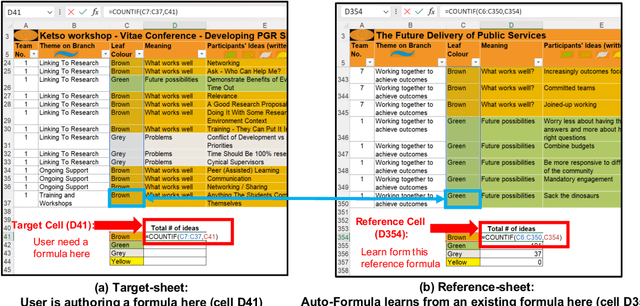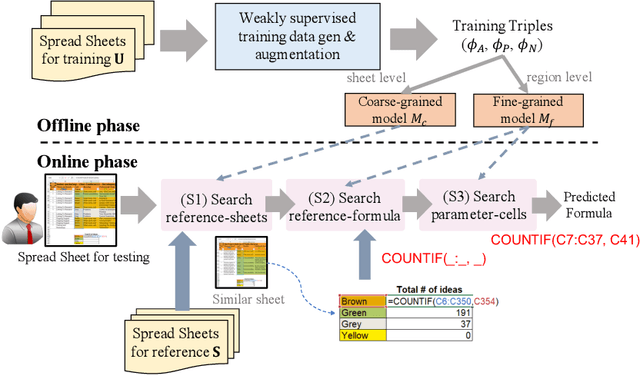Sibei Chen
TAIJI: MCP-based Multi-Modal Data Analytics on Data Lakes
May 16, 2025Abstract:The variety of data in data lakes presents significant challenges for data analytics, as data scientists must simultaneously analyze multi-modal data, including structured, semi-structured, and unstructured data. While Large Language Models (LLMs) have demonstrated promising capabilities, they still remain inadequate for multi-modal data analytics in terms of accuracy, efficiency, and freshness. First, current natural language (NL) or SQL-like query languages may struggle to precisely and comprehensively capture users' analytical intent. Second, relying on a single unified LLM to process diverse data modalities often leads to substantial inference overhead. Third, data stored in data lakes may be incomplete or outdated, making it essential to integrate external open-domain knowledge to generate timely and relevant analytics results. In this paper, we envision a new multi-modal data analytics system. Specifically, we propose a novel architecture built upon the Model Context Protocol (MCP), an emerging paradigm that enables LLMs to collaborate with knowledgeable agents. First, we define a semantic operator hierarchy tailored for querying multi-modal data in data lakes and develop an AI-agent-powered NL2Operator translator to bridge user intent and analytical execution. Next, we introduce an MCP-based execution framework, in which each MCP server hosts specialized foundation models optimized for specific data modalities. This design enhances both accuracy and efficiency, while supporting high scalability through modular deployment. Finally, we propose a updating mechanism by harnessing the deep research and machine unlearning techniques to refresh the data lakes and LLM knowledges, with the goal of balancing the data freshness and inference efficiency.
Auto-Formula: Recommend Formulas in Spreadsheets using Contrastive Learning for Table Representations
Apr 19, 2024



Abstract:Spreadsheets are widely recognized as the most popular end-user programming tools, which blend the power of formula-based computation, with an intuitive table-based interface. Today, spreadsheets are used by billions of users to manipulate tables, most of whom are neither database experts nor professional programmers. Despite the success of spreadsheets, authoring complex formulas remains challenging, as non-technical users need to look up and understand non-trivial formula syntax. To address this pain point, we leverage the observation that there is often an abundance of similar-looking spreadsheets in the same organization, which not only have similar data, but also share similar computation logic encoded as formulas. We develop an Auto-Formula system that can accurately predict formulas that users want to author in a target spreadsheet cell, by learning and adapting formulas that already exist in similar spreadsheets, using contrastive-learning techniques inspired by "similar-face recognition" from compute vision. Extensive evaluations on over 2K test formulas extracted from real enterprise spreadsheets show the effectiveness of Auto-Formula over alternatives. Our benchmark data is available at https://github.com/microsoft/Auto-Formula to facilitate future research.
ChatPipe: Orchestrating Data Preparation Program by Optimizing Human-ChatGPT Interactions
Apr 07, 2023Abstract:Orchestrating a high-quality data preparation program is essential for successful machine learning (ML), but it is known to be time and effort consuming. Despite the impressive capabilities of large language models like ChatGPT in generating programs by interacting with users through natural language prompts, there are still limitations. Specifically, a user must provide specific prompts to iteratively guide ChatGPT in improving data preparation programs, which requires a certain level of expertise in programming, the dataset used and the ML task. Moreover, once a program has been generated, it is non-trivial to revisit a previous version or make changes to the program without starting the process over again. In this paper, we present ChatPipe, a novel system designed to facilitate seamless interaction between users and ChatGPT. ChatPipe provides users with effective recommendation on next data preparation operations, and guides ChatGPT to generate program for the operations. Also, ChatPipe enables users to easily roll back to previous versions of the program, which facilitates more efficient experimentation and testing. We have developed a web application for ChatPipe and prepared several real-world ML tasks from Kaggle. These tasks can showcase the capabilities of ChatPipe and enable VLDB attendees to easily experiment with our novel features to rapidly orchestrate a high-quality data preparation program.
 Add to Chrome
Add to Chrome Add to Firefox
Add to Firefox Add to Edge
Add to Edge